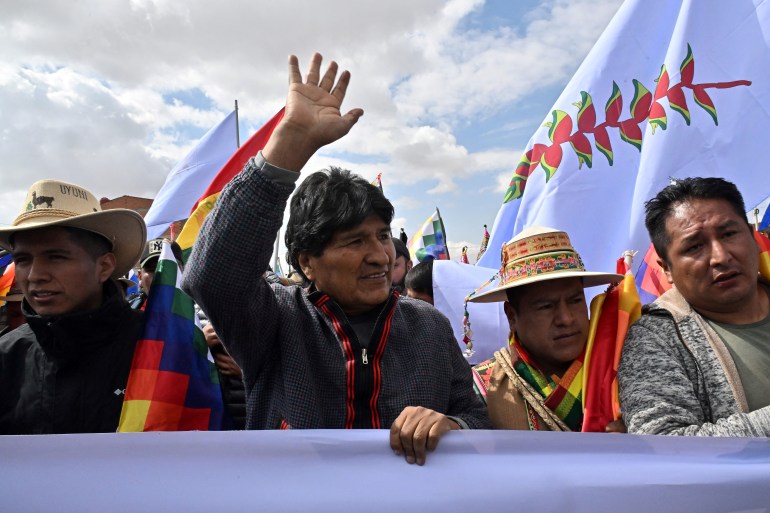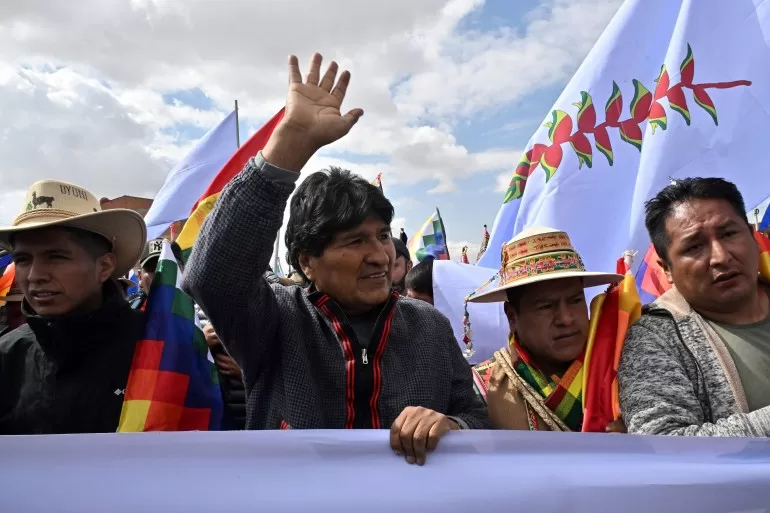A simmering political battle between former allies is threatening to boil over into an all-out struggle for power after Bolivia’s popular and controversial former leftist president, Evo Morales, called on supporters to take to the streets in protest against current President Luis Arce.
Morales announced a weeklong “March to Save Bolivia” on Monday after Arce accused him on national TV of trying to overthrow his government in a coup attempt.
Antigovernment protesters blocked roads on the outskirts of the capital, La Paz, on Tuesday, calling for Arce’s resignation due to his mismanagement of the economy.
Supporters also blocked roads leading to Lake Titicaca, shared by Bolivia and Peru and a popular tourist destination.
“It’s an incompetent government that we have, and it won’t solve the economic crisis,” said Pablo Merma, a peasant leader of the so-called Red Ponchos, rebel Indigenous activists from the high plains, who was among the protesters.
Morales: a disgraced former strongman
Bolivia’s political and economic crisis, sparked by fuel shortages and dwindling foreign currency reserves, has caused some Bolivians to grow nostalgic for the disgraced former strongman who famously reduced poverty while in office.
Although Arce was Morales’s former economy minister and his candidate in Bolivia’s 2020 elections, the erstwhile allies began vying for power after Morales returned from exile seeking to make a political comeback.
Alleged coup attempt
Over the past year, the Arce-Morales rift has polarised Bolivia, tainting the country’s politics and creating a sense of turmoil that soldiers sought to seize upon in June in a bizarre supposed coup attempt.
Speaking to reporters, Morales encouraged the international community to follow his near 200km (124-mile) march along a highway from the southeast village of Caracollo to La Paz.
“The march is the response of a people fed up with their unthinking government, which has maintained absolute silence in the face of the crisis, corruption and the destruction of stability,” Morales wrote on the social media platform X.
Morales made his appeal to Bolivia’s farmers, miners and peasants on Monday after an unprecedented televised speech by Arce late on Sunday, in which he lambasted his former mentor.
Arce accused Morales of trying to sabotage his administration and undermine democracy, escalating a high-stakes power struggle that has pushed Bolivia to the brink.
“Enough, Evo!” Arce exclaimed on state TV. “Until now, I have tolerated your attacks and slander in silence. But putting the lives of people at risk is something I cannot tolerate.”

“Democracy at risk”
Arce, who has faced a series of mounting crises with his governing party riven by disagreements, alleged that Morales’s attempts to mobilise support and run against Arce in next year’s presidential election were “putting democracy at risk.”
“You are threatening the entire country,” Arce said, claiming that Morales sought to return to power by “means fair or foul”.
His dramatic speech in the Andean nation of 12 million dredged up the chaos and bloodshed of 2019, when Morales ran for an unconstitutional third term and won. After accusations of fraud led to mass protests, Morales resigned under pressure from the army, in what his supporters call a coup.
At least 36 people were killed in the ensuing crackdown by security forces.
Morales, who served as Bolivia’s first Indigenous president from 2006-2019, was extremely popular until he tried to bypass the constitution and seek a fourth term.
Ever since the constitutional court last year barred the charismatic leader from the race, coca cultivators, Indigenous tribes and workers have come to his defence with street protests, marches and road blockades.
Another protest leader, Ponciano Santos, warned Arce that the social movement would hold him responsible for whatever happened on Tuesday.
“If you tear gas us, if you interfere with our march, the government will fall,” Santos told reporters.
